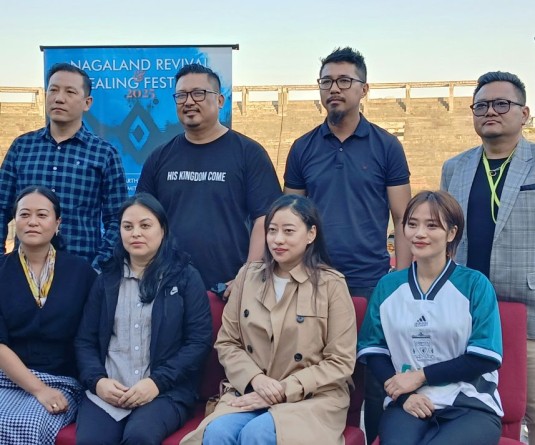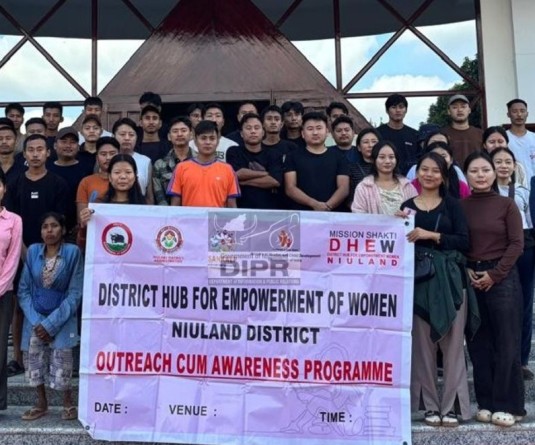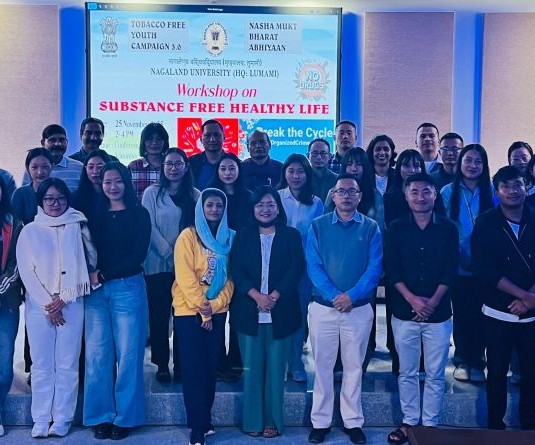Neingulo Krome, Secretary General of the Naga Peoples’ Movement for Human Rights (NPMHR) makes a point during the interaction session of the Morung Lecture at DABA’s Elim Conference Hall, Duncan Bosti on April 2. Dr. Visakhonü Hibo, Principal of Japfü Christian College was the other speaker at the Lecture. (Morung Photo)
Morung Express News
Dimapur | April 2
For the Naga people, the question of human rights has been reduced from the language of ‘peoples’ and ‘political aspirations’ to the status of ‘scheduled tribes’ and ‘special provisions.’ This itself has led to a depraved condition of human rights in Naga society today, particularly after the formation of the Nagaland State.
To address the issue of human rights in Naga society today, and its course in the future, Dr. Visakhonü Hibo, Principal of Japfü Christian College and Neingulo Krome, Secretary General of the Naga Peoples’ Movement for Human Rights (NPMHR) spoke at the Morung Lecture at DABA’s Elim Conference Hall, Duncan Bosti, here today.
The ‘Morung Lectures’ is an initiative of The Morung for Indigenous Affairs & JustPeace, and The Morung Express. Questioning if we are speaking freely and openly about human rights, Dr. Hibo stated that Naga patriotism was inspired by protection of land, culture and dominated our societies ever since. “The past holds a sober emotional attachment for every Naga who has an inkling of Naga history,” she noted. “However of late, a kind of nationalism which every day people like me are failing to identify with is fearsomely looming large and thus confuses and often violates basic human rights.”
In the self-sufficient Naga villages of yore, natural village citizenry led to “rights of each other regarded, duties and responsibility fulfilled without reminders or compulsion,” she said. Today, the “we feeling” of the yesteryears has been replaced by “mobocracy.”
“Rule of law has surrendered to mobocracy. Strength is might and might is right.” For the educationist, “mobocracy” is led by not only about those wielding guns but also those leaders who are residing in “glass houses.” They need change before talking of human rights.
“It will take a generation for us (to reach) where rationality clears issue of gender equity, child abuse, community relation, majority-minority conflict, forward-backward dilemmas, difficulties of unity and reconciliation without willing to change at the individual and collective levels,” Dr. Hibo reflected. According to her, to change, rule of law and the government should become supreme and human rights ensured to us.
Neingulo Krome drew the picture before the 1997 ceasefire, the conditions that led to the ceasefire and how it changed the scenario of violence in Naga society. Explaining the work done by NPMHR since 1978, he noted how slowly the work transformed from addressing the abuses by the Indian State of the Naga people to addressing those within the Naga family.
“The situation was beyond any human rights organisation to control or even to talk about. Situation became even more dangerous even to talk about them,” he stated, highlighting how the Naga movement could not carry on without money, guns and bullets at some point of time.
“So when ceasefire came in 1997, we thought we must make the most of it. Without any invitation, without any ownership, we said this ceasefire must work,” the Secretary General of NPMHR said, noting how at the time in Nagaland, “we had no time to talk about health, education. We were just worried whether we can wake up the next day alive.”
As the older generation has completed innovative campaigns such as people-to-people dialogues between the Indian and Naga civil bodies, Krome hoped that the “competent” younger generation will design ways to address human rights through a contextual lens.
In a long public discussion on human rights that ensued, while Dr. Sedevi Angami wondered how we can inculcate human dignity, respect and inclusiveness without which “we lose credibility as a society,” child and women rights activist NK Keny asserted how Naga society has no option but to take necessary action on the rights of women and children, on disability, healthcare, the forensics of rape and sexual violence, domestic violence, child soldiers etc.
Shared humanity as core of human rights
Editor of The Morung Express, Dr. Aküm Longchari, pointed out that it is the responsibility of the State to protect rights. However, while noting that 1960 was a key event in Naga history, he questioned whether the 16 point agreement was part of a counter insurgency policy, devoid of the social contract between peoples that gives a State its legitimacy. The State, in this case Nagaland State, thus, has “implications on our rights” as it was not the result of the “democratic will of the people” with majority of the people left out of the process.
Human rights are the “foundation of our future” and to get to them, “we have to traverse the trajectory of our evolution,” he said, asserting that “Nationalism that does not respect rights of the people is exhausted nationalism.” Nationalism gains legitimacy only through upholding shared humanity as the core of human rights.
The human rights movement, then, has to go beyond the “voice of protest/resistance,” being complemented with “voices of equality and culture of dignity.”
The language of human rights, he concluded, has to be rediscovered, and incorporated into everyday life, which will decide its onward course in Naga society.





